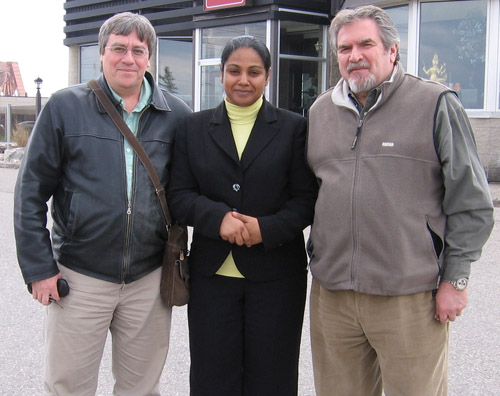
When she submitted her PhD thesis to graduate studies May 16, Sarathi Weraduwage didn’t know that this major milestone in her life would also be a milestone for the University of Guelph. Her thesis was the 1,000th paper published electronically through the Atrium, U of G’s open access digital repository for scholarly work.
The University began accepting theses and dissertations electronically in 2006 and mandated the process in 2011. Submissions from graduate students are managed by the Office of Graduate Studies in partnership with the University of Guelph Library, which houses the Atrium. Once theses are approved and placed in the digital repository, they are harvested by National Library and Archives Canada.
The library’s Atrium also accepts scholarly submissions from faculty, staff and other affiliated scholars.
After seven years of work with Profs. Barry Micallef and Bernard Grodzinski in the Department of Plant Agriculture, Weraduwage defended her thesis April 25 and will receive her degree at convocation June 13. The title is “Harnessing the anabolic properties of dark respiration to enhance sink activity at elevated CO2 using Arabidopsis thaliana L. with partially-suppressed mitochondrial pyruvate dehydrogenase kinase.”
While it won’t be easy reading for most of us, her research will be of interest to scientists around the world who are investigating, as she did, the effect of carbon dioxide (CO2) on plant growth. She says this body of work will benefit the agriculture sector as climate change leads to increased levels of CO2 in the atmosphere.
Weraduwage drew on evidence from previous research and commercial greenhouse operations showing that exposure to elevated CO2 can enhance photosynthetic rates in plants and result in enhanced growth and yield – to a point. Under long-term exposure, or as the CO2 concentration increases, she says the response from crop plants decreases and eventually levels off.
Her PhD research introduced a novel method to enhance the ability of Arabidopsis thaliana (a common weed belonging to the mustard family and a model organism in plant biology research) to utilize additional carbohydrates synthesized under elevated CO2 by harnessing the anabolic properties of plant respiration. Her studies did show improvements in vegetative and reproductive growth and enhanced seed and oil productivity, especially at elevated CO2, as well as an improvement in photosynthesis and water-use efficiency in some genetically modified Arabidopsis plants.
Weraduwage came to Canada in 2004 from Sri Lanka, where she completed an undergraduate degree in botany at the University of Colombo and worked as an assistant lecturer in plant sciences. She started a master’s program at U of G in 2006, transferring after two years into the PhD stream.
She says having her thesis available on the Atrium website is an advantage to her as she applies for a post-doctoral position to continue the research: the paper is 257 pages long and filled with photographs and detailed diagrams of research techniques. Online access makes it possible for other scientists to find her work more easily.
The Atrium repository provides many benefits for the University, adds Jane Burpee, research enterprise and scholarly communications librarian. “Hosting theses online improves the visibility and impact of U of G graduate scholarship. The Atrium’s open access format increases visibility and readership, thus significantly increasing global access to the University’s scholarly output.”
These are important considerations for transferring research knowledge and ultimately benefitting the agriculture industry, says Weraduwage. That was, after all, a key reason she chose to complete her graduate work at the University of Guelph. “I liked the project suggested by my co-advisors (Profs. Micallef and Grodzinski) and the fact that it was agriculture-oriented and integrated many disciplines, such as plant physiology, biochemistry, molecular biology and horticulture.”
Lay readers may take notice of the fact that this 1,000th thesis devoted a full three pages to acknowledging the help Weraduwage received during her graduate work. She thanks a large group of people, including her husband and family, her U of G advisers, other Guelph faculty and grad students, administration staff, several international contacts, research technicians in several university departments, IT technicians and technicians who maintain the greenhouses where she often worked, as well as the janitorial and maintenance staff. “So many people helped me; I couldn’t forget them,” she says.
Referring to all graduate research projects, she adds: “There is so much work that happens around our projects and so many people are involved; we can’t do without them.”
Receiving special mention are the agencies that funded Weraduwage’s research and the scholarships she received: the Natural Sciences and Engineering Research Council through the Green Crop Networks Research Network, the Ontario Graduate Scholarship program, a Syngenta Graduate Scholarship, the Ball Farm Services and Agrico Canada Ltd. Scholarship, the Mrs. Fred Ball Scholarship, the Arthur D. Latornell Scholarship, the Hoskins Scholarship, a Robb Graduate Research Travel Grant, the registrar’s and dean’s scholarships, and travel awards and bursaries from the University and the Ontario Agricultural College.
“My research would not have been possible if not for the funding provided by these many generous donors,” she says.
To access the Atrium repository, visit http://atrium.lib.uoguelph.ca/.